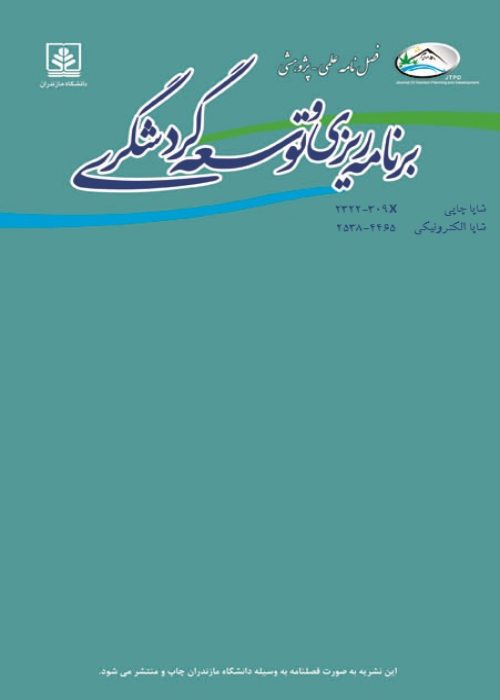The Effect of Climate Hazards on the Number of Foreign Tourists in the City of Isfahan
Author(s):
Article Type:
Research/Original Article (دارای رتبه معتبر)
Abstract:
This study is aimed to investigate the effect of climatic hazards on the number of foreign tourists in Isfahan.To do that, we used statistics of total precipitation, absolute minimum of temperature, absolute maximum of temperature, maximum precipitation in 24 hour, number of dusty days, number of icy days and air quality index in IsfahanCity andstatistics ofNumber of foreign touristson monthly basis from 1382 to 1393 .So we used linear regression and Pearson Correlation .The results have shown that during the studied period thenumber of tourists has been affected more than other hazards respectively by air pollution, extreme heats, icy days, extreme cold, dust, drought and finally extreme precipitation .
The study and identification of climate constraints and hazards to consider them in planning at various national , provincial and urban levels is important for tourism development.On the other hand, inappropriate weather conditions reduce positive aspects and attractions of a tourist area and cause adverse effects on tourism. Data and Methods: At first, the SPI method was used to investigate drought in Isfahan.Then using linear regression and Pearson correlation tests, the correlation between the studied parameters was done on the monthly and annual scale.In the following the correlations were done by a one-month, two-month, and one-year delay.
Introduction
Tourism is one of the main sectors of the world economy and is heavily influenced by climatic and climate conditions.Therefore knowledge of the climate hazards in each region and its effects on tourism will play a significant role in tourism management and planning as well as increasing demand of the region tourists .Considering that exploitation of the environmental capabilities in each region can lead to the development of the region and , on the other hand, the climate is one of the main factors in the development of the regions;The study and identification of climate constraints and hazards to consider them in planning at various national , provincial and urban levels is important for tourism development.On the other hand, inappropriate weather conditions reduce positive aspects and attractions of a tourist area and cause adverse effects on tourism. Data and Methods: At first, the SPI method was used to investigate drought in Isfahan.Then using linear regression and Pearson correlation tests, the correlation between the studied parameters was done on the monthly and annual scale.In the following the correlations were done by a one-month, two-month, and one-year delay.
Results
The results of studies have shown that in the monthly scale the air quality index in during the months from Farvardin to Tir, Shahrivar and Esfand, extreme precipitation in Mordad, Mehr and Dey , the extreme cold in Aban, and extreme heats in Azar , more than other hazards have affected the number of foreign tourists.The correlation between the studied parameters with one-month delay also showed that the air quality index in Khordad , extreme precipitation in Aban and the extreme cold in Azar, more than other hazards have affected the number of tourists.During the two-month delay, dust in Mehr, extreme precipitation in Azar and the extreme cold in Dey , more than other hazards have affected on the number of tourists.In the annual scale, the extreme coldfrom 1382 to 1385 and 1387, extreme heats from1386to 1392 andfrosty in 1391, more than other hazards have affected on the number of tourists.During the one-year delay ,the extreme coldfrom 1383 to 1385, extreme heats from1386 and 1387, the air quality index in 1388 and the icy days from 1392 and 1393 were the most significant hazard to the number of tourists.Keywords:
Language:
Persian
Published:
Journal of Tourism Planning and Development, Volume:7 Issue: 26, 2018
Pages:
146 to 168
magiran.com/p1916953
دانلود و مطالعه متن این مقاله با یکی از روشهای زیر امکان پذیر است:
اشتراک شخصی
با عضویت و پرداخت آنلاین حق اشتراک یکساله به مبلغ 1,390,000ريال میتوانید 70 عنوان مطلب دانلود کنید!
اشتراک سازمانی
به کتابخانه دانشگاه یا محل کار خود پیشنهاد کنید تا اشتراک سازمانی این پایگاه را برای دسترسی نامحدود همه کاربران به متن مطالب تهیه نمایند!
توجه!
- حق عضویت دریافتی صرف حمایت از نشریات عضو و نگهداری، تکمیل و توسعه مگیران میشود.
- پرداخت حق اشتراک و دانلود مقالات اجازه بازنشر آن در سایر رسانههای چاپی و دیجیتال را به کاربر نمیدهد.
In order to view content subscription is required
Personal subscription
Subscribe magiran.com for 70 € euros via PayPal and download 70 articles during a year.
Organization subscription
Please contact us to subscribe your university or library for unlimited access!




